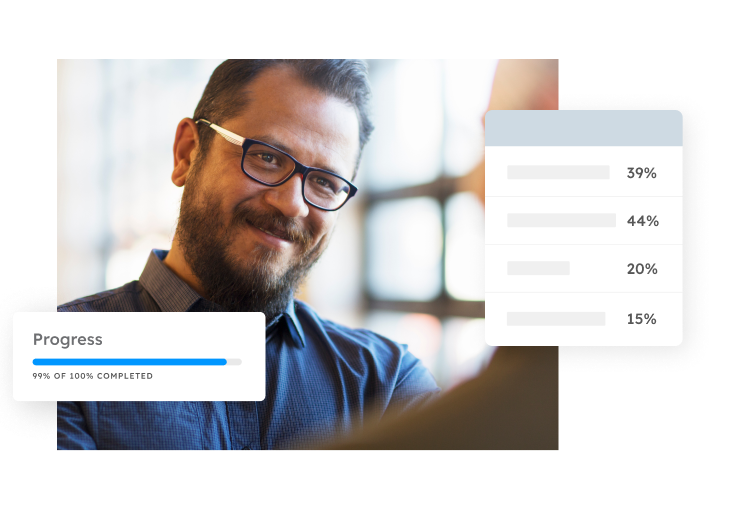Set the standard for research integrity
Protect research integrity with advanced plagiarism and AI detection, while boosting workflow efficiency throughout the research journey.
Why research integrity matters
For institutions, researchers, and publishers alike, safeguarding research integrity is key to:
- Building trust in research findings.
- Strengthening the credibility of institutions and publishers.
- Safeguarding high professional and ethical standards.
- Driving genuine scientific and academic progress.
Publish with confidence
From maintaining originality to confronting evolving challenges, now is the time to reinforce the foundations of research integrity.

Develop original research
Foster a deep understanding of accepted research writing practices while minimizing the risk of inadvertent plagiarism.

Safeguard against emerging technologies
Gain confidence in the scholarly merit of submitted works as generative AI continues to disrupt the principles of research ethics.

Break down barriers
Reduce the time involved in the writing and review process with increased visibility, efficiency, and automation.

Comply with global standards
Ensure papers align with international research integrity standards ahead of submission.

Unlocking solutions for success with Turnitin
From education to research and publishing, Turnitin helps organizations safeguard quality, enhance workflows, and foster innovation.

Incorporated into the top publishers’ workflow and process, iThenticate creates an environment that fosters collaboration, empowers the research community to publish with confidence, and actively promotes integrity in research. With an easy-to-use submission process that checks for similarity against the world’s top published works as well as AI-written text, researchers, institutions and other organizations can feel confident that their reputation will be protected.
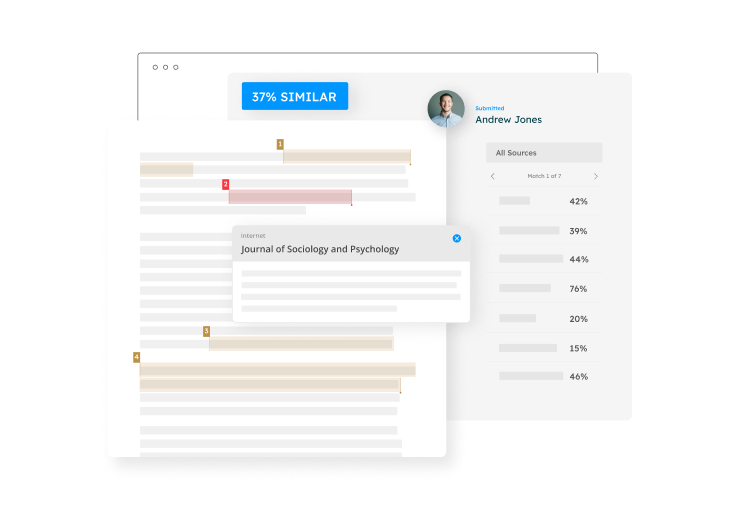
Ready to talk? Chat with an expert.
Schedule a callDiscover a suite of solutions that empower the research community

Institutions
Safeguard your institution’s reputation by fostering a commitment to research integrity and supporting researchers in producing original, credible work.

Researchers
Protect the originality of your work and maintain scholarly integrity with advanced tools that help you meet the highest standards in your field.

Publishers
Uphold publishing standards and combat research misconduct by verifying the originality of submitted content before publication.

Corporate and government
Strengthen the credibility of professional content with tools designed to uphold originality, streamline review processes, and maintain high standards across every project.
Grow confidently with Turnitin
Turnitin solutions seamlessly integrate with a wide array of third-party platforms and systems, enabling custom workflows for organizations of all sizes. Leveraging a robust global cloud infrastructure, we ensure secure, high-standard data processing that can easily scale to meet the evolving needs of our customers, whether in research, education, or business.
Used by leading academic publishers
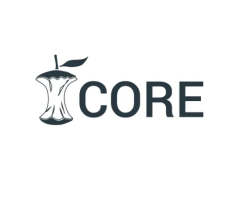
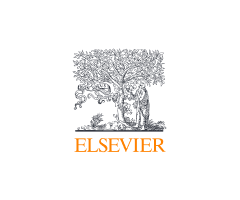
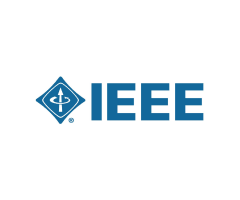

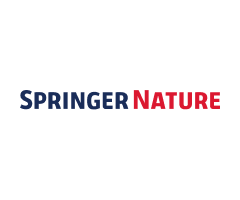

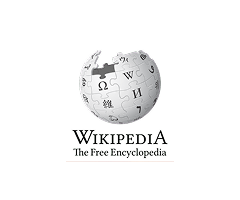

Ready to talk? Chat with an expert.
Research integrity FAQs
Collapse all
What is research integrity?
Research integrity refers to the ethical principles and professional standards that guide researchers as they conduct and present their work. It involves ensuring accuracy in data collection, attributing sources correctly, and avoiding misconduct such as plagiarism and data fabrication. Upholding research integrity means working responsibly, honestly, and transparently, contributing to credible findings that can be trusted by peers and the wider public.
What are the most common types of research misconduct?
Research misconduct often includes plagiarism, data fabrication, and falsification. Other violations include ghostwriting, failure to disclose conflicts of interest, and unethical authorship practices, such as granting authorship to individuals who did not contribute significantly to the research. Since 2022, the rise of generative AI tools like ChatGPT has added complexity to research integrity, with concerns around the undisclosed use of AI-generated content. Addressing these challenges is essential to maintain the transparency, accuracy, and credibility of published research.
How can researchers protect themselves against accidental research misconduct?
Accidental misconduct often occurs as unintentional plagiarism or data errors. Researchers can safeguard their work by meticulously documenting sources, double-checking data accuracy, and leveraging software solutions that identify potential issues, such as plagiarism and duplicate submissions, before publication. These practices help maintain credibility and ensure integrity in research.
How can researchers maintain integrity in an era of AI-assisted writing?
Advancements in AI have changed the research landscape, making it essential for researchers, publishers, and scholars to uphold rigorous standards of integrity. Adopting tools that identify AI-generated content, enables the research community to detect and prevent potential misuse of generative AI tools like ChatGPT.
How can research integrity software help me publish with confidence?
Research integrity software ensures your work meets the highest standards of originality and ethical publication practices. It includes a research paper plagiarism checker, AI-generated content detection, and customizable exclusion options, helping authors produce credible, trustworthy research. With access to extensive scholarly databases and customizable exclusion options, you’ll receive comprehensive results, enabling you to submit or publish your work confidently, knowing it aligns with academic and professional standards.
How can Turnitin help scholars, researchers, and publishers uphold research integrity?
Turnitin supports scholars, researchers, and publishers in upholding research integrity by providing solutions that promote originality, transparency, and accountability. By adopting Turnitin as a research paper plagiarism checker, users can compare their academic work against a comprehensive database of scholarly writing, web content, and open-access repositories to identify potential instances of plagiarism or misconduct. Advanced features, such as AI writing detection and private repository comparisons, further assist in maintaining ethical standards by detecting unauthorized use of generative AI and preventing collusion.
What content does Turnitin check for similarity?
Turnitin provides access to a vast and diverse collection of content for comprehensive similarity checking, which many may describe as a research paper plagiarism checker. This includes scholarly publications, open-access records, theses, legal reviews, and unique content sourced through strategic partnerships. The extensive database ensures accurate similarity detection across a broad range of disciplines and languages, supporting researchers and publishers in maintaining integrity.
How does Turnitin keep my institution’s data secure?
Turnitin prioritizes the security of your research data by implementing robust protective measures. Data is stored in highly secure regional data centers, ensuring compliance with local data privacy regulations, and additional security features safeguard your information throughout the process. With stringent privacy and protection policies, Turnitin ensures that research data is handled with the utmost care, providing researchers with the confidence that their work is secure and trustworthy.

